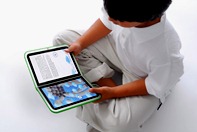Get ePub or Kindle file of this
 A national digital library system for the United States must not be just a huge collection of e-books, multimedia files, wires, and servers.
A national digital library system for the United States must not be just a huge collection of e-books, multimedia files, wires, and servers.
Among other essentials, it also needs relationships with libraries, schools of all kinds, and the people who create books and other content. Ideally libraries or a related nonprofit could buy OverDrive, an existing commercial service, as a way to kickstart a national digital system for the United States.
The e-library issue is really a K-12 one in some ways, and should be part of the national agenda, especially with education so often hailed as a major way to fight poverty and joblessness.
Hello, Barack Obama? E-textbooks for schools are not enough. We also need a full-service national digital library system for Americans of all ages, not just young families but also workers in need of training—as well as disabled people lacking the mobility to get to the library.
 Online interactivity and social media features and other nonbook items and services are “musts” for a modern digital library system, and I’m all in favor of local libraries experimenting with innovations like hackerspace. Library book clubs, e- and p-, are also terrific. But don’t get libraries out of the business of providing the books themselves, whatever the medium. An OverDrive purchase, financed by foundations or public-spirited philanthropists, could help immensely.
Online interactivity and social media features and other nonbook items and services are “musts” for a modern digital library system, and I’m all in favor of local libraries experimenting with innovations like hackerspace. Library book clubs, e- and p-, are also terrific. But don’t get libraries out of the business of providing the books themselves, whatever the medium. An OverDrive purchase, financed by foundations or public-spirited philanthropists, could help immensely.
For newcomers to the e-library issue, some relevant links appear below:
—Should OverDrive sell itself to America’s public libraries? Any foundation angels care to help?
While academic and other research needs count, one of the most rewarding uses of a national digital library system would be the promotion of family literacy, and popular content from publishers carried by OverDrive could help meet this goal.
Among LibraryCity’s posts on family literacy are The nuts and bolts of using tablet computers, e-libraries, and family literacy initiatives to encourage young children to read and How a national digital library system could help promote early childhood learning—and academic and vocational success later on. A bunch of other mentions of family literacy are here. One possibility would be to make both paper books and e-books available in partnership with local libraries and other organizations, rather than just one medium or the other. Physical books could excite children about reading, while e-books would be an economical way for them to explore their passions. Since mothers and fathers are role models, they should be able to enjoy books catering to their own interests, rather than simply those for their offspring. And libraries should offer parental guidance and focus on motivated families, as opposed to simply giving out e-tablets helter-skelter.
In the United States, the most promising of all the existing digital library project is the Digital Public Library of America. One shortcoming of the DPLA is insufficient attention paid to mass needs. But I consider this to be very fixable, and an OverDrive purchase by libraries working with the DPLA would help. When I checked last week, some key DPLA participants seemed open minded about the OverDrive idea if details could be worked out. OverDrive is the major company in this area, the reason I’m focusing on it.
About LibraryCity: More information here. This is a small, voluntary, grassroots effort without any hidden angels, and we’ll welcome relevant essays from readers, as well as other nonfinancial assistance (no need for money—just other kinds of support to enlighten policymakers). Questions? Just email.
Photo at top: Shows child reading from a One Laptop Per Child prototype.
Similar Posts:
- Smug about OverDrive? A whopping 39 percent of U.S. public libraries don’t offer downloadable e-books. Does D.C. care? E-textbooks are no substitute, Mr. President
- Helping kids get going on e-books: The wrong approach could HURT them
- Related writings
- U.K.’s planned library closings show risk of NOT digitizing U.S. libraries
- More ammunition for a national digital library system playing up early childhood education and a family literacy approach? Thanks, Messrs. Kristof and Friedman!